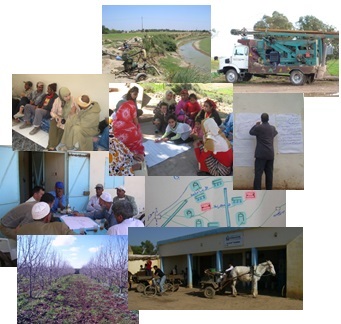Meriem Jendoubi, Emeline Hassenforder, Guillaume Lestrelin, Amar Imache, Houssem Braiki, Audrey Barbe
DOI: https://doi.org/10.60569/8-a7
Résumé
De plus en plus d’initiatives de développement rural au Maghreb affichent une volonté d’adopter des approches participatives. Or, pour les agents de l’administration, la mise en œuvre de ces approches implique souvent un changement de posture et l’acquisition de connaissances et de compétences spécifiques. Comme tous les agents ne peuvent pas être formés à la participation, bon nombre d’initiatives adoptent une stratégie reposant sur une hypothèse de partage de compétences et de posture entre un petit groupe d’agents de l’administration qui sont formés à la participation et leurs collègues. Cet article vise à analyser dans quelle mesure ce partage de compétences et de posture est effectif ou non dans le cas d’une démarche participative mise en œuvre sur un territoire rural en Tunisie. Notre analyse repose sur 12 entretiens individuels réalisés auprès d’agents de l’administration. Notre analyse montre qu’il y a eu un partage partiel entre les facilitateurs de la démarche et les agents de l’administration qui ont été impliqués. Les personnes interrogées ont notamment acquis des compétences sur les outils participatifs et pour l’une d’entre elles au moins un changement de posture est envisagé. On ne peut pas dire pour autant que leur implication dans la démarche, quel que soit son degré, ait changé leur vision sur la participation. Le partage de compétences et de posture pourrait être renforcé par une réflexion plus poussée sur la distribution des rôles et des responsabilités entre agents de l’administration lors de l’ingénierie de la démarche.
Mots clés : décentralisation, développement rural, territoire, savoir être, planification participative
هل بالتواصل مع الميسرين تتعلم المشاركة؟ تبادل المهارات والسلوك داخل الإدارة الفلاحية في تونس
الخلاصة
تظهر العديد من مبادرات التنمية الريفية في المغرب العربي الرغبة في إعتماد مقاربات تشاركية. تطبيق هذه المقاربات من قبل، أعوان الإدارة يستوجب حتما تغير في سلوكهم الشخصي واكتساب معارف ومهارات خصوصية. ونظرا لإستحالة تدريب جميع الأعوان، هناك عديد من المبادرات التي تعتمد استراتيجية مبنية على فرضية مشاركة المهارات والسلوكيات بين مجموعة صغيرة من أعوان الإدارة المتكونين في مجال المشاركة مع زملائهم. هدف هذا المقال هو تحليل إمكانية تبادل الخبرات والسلوكيات من عدمه في حال إعتماد مقاربة تشاركية على منطقة ريفية تونسية. يرتكز تحليلنا على 12 محادثة فردية مع اداريين. اظهرت التحاليل تبادل جزئي بين ميسري المقاربة التشاركية وأعوان الإدارة المعنيين ايضا بالمقاربة. الإداريين الذين تم استجوابهم اكتسبوا مهارات تخص آليات المشاركة وإحداهن على الأقل تغيرسلوكها بشكل ملحوظ.لا يمكننا الجزم ان إنخراطهم في التمشي التشاركي مهما كانت درجته قد غير نظرتهم حول المشاركة يمكن تدعيم تبادل الخبرات والسلوكيات عبر تفكير معمق حول توزيع المهام والمسؤوليات بين أعوان الإدارة ضمن هندسة المقاربة.
كلمات مفاتيح: اللامركزية، التنمية الريفية، منطقة، الهيئة، التخطيط التشاركي
Learning Participation Through Contact with Facilitators? Sharing Skills and Attitudes Within the Agricultural Administration in Tunisia
Abstract
Increasingly, rural development initiatives in the Maghreb express a desire to adopt participatory approaches. For administrative agents, however, implementing these approaches often requires a change in attitude and the acquisition of specific knowledge and skills. Since not all agents can be trained in participation, many initiatives adopt a strategy based on the assumption that skills and attitudes will be shared between a small group of trained administrative agents and their colleagues. This article aims to analyze the extent to which such sharing of skills and attitudes is effective in the case of a participatory process implemented in a rural area in Tunisia. Our analysis is based on 12 individual interviews conducted with administrative agents. The results show that there was partial sharing between the facilitators of the process and the involved administrative agents. Respondents notably acquired skills related to participatory tools, and for at least one individual, a change in attitude is envisaged. However, it cannot be said that their involvement in the process, whatever its extent, has changed their overall view on participation. The sharing of skills and attitudes could be strengthened through a more thorough reflection on the distribution of roles and responsibilities among administrative agents during the design of the participatory process.
Keywords: decentralization, rural development, territory, interpersonal skills, participatory planning

